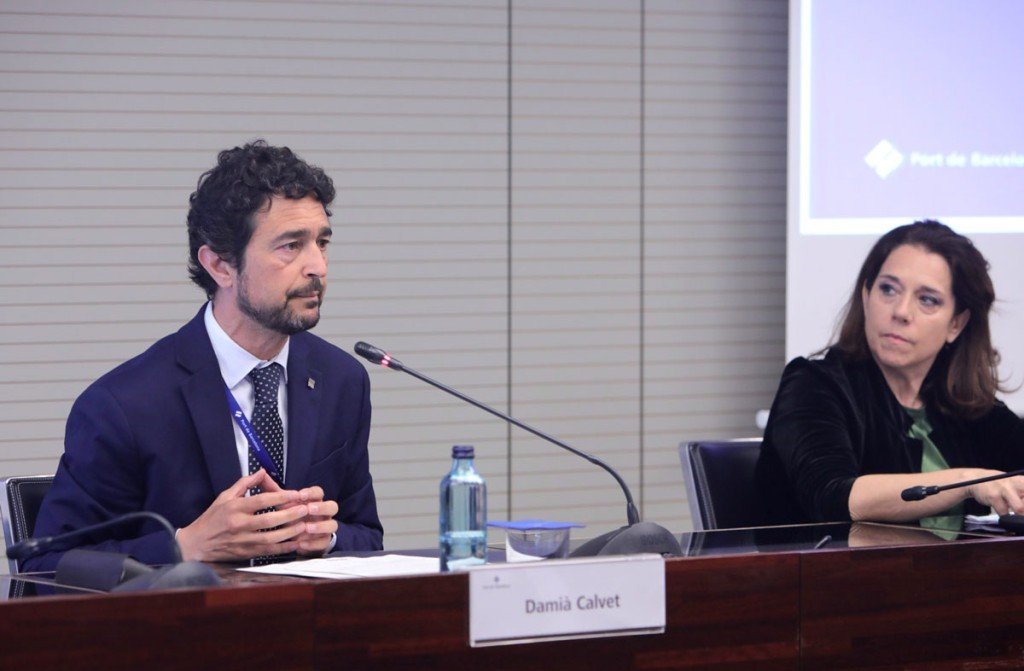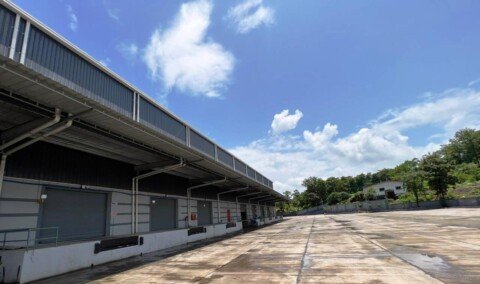The Port of Barcelona has launched its Innovation Plan to coordinate the advancement, under the same umbrella, of the various projects that are transforming the way the Port is offering its services, as they place it at the forefront of economic and social growth. The Innovation Plan was unveiled on May 13 by Damià Calvet, President of the Port of Barcelona and Emma Cobos, Director of Innovation and Business Strategy, Port of Barcelona.
For the Port, innovation means turning new ideas into value for the Port Community, its customers and society at large. The Innovation Plan, which develops the proposals specified in the Fourth Strategic Plan, establishes its own innovation model based on the smart port concept and therefore considers that innovation must be sustainable, open, collaborative, demand-driven, aligned with the Port’s strategy and have a strong technological base.
“With the Port of Barcelona’s Innovation Plan, the city’s innovation will look out to sea,” said Damià Calvet
The Plan defines three main objectives: strengthening the Port of Barcelona’s role as a driver of economic growth and recovery; driving innovation and digitisation of the logistics ecosystem; and fostering synergies with the city in this area.
The Innovation Plan is structured around four lines of action:
Developing nimble and cross-cutting management tools involving the Port Community of Barcelona.
Forging alliances with the innovative environment of Barcelona.
Stimulating sectoral innovation.
Disseminating the Port’s innovative activity.
Within this scope, Damià Calvet explained that the Port of Barcelona has always been at the forefront of the Spanish port system and also of the Mediterranean and European ports when it comes to proposing, designing and putting into service innovative solutions in areas as diverse as logistics (Logistics Activities Area), the networked port and the inland terminals (Zaragoza Maritime Terminal), the port-city (Port Vell), the participation of the port community (Steering Council of the Port Community of Barcelona, Telematic Forum), training (European School of Intermodal Transport), telematics (Portic), inter alia.
The Port President explained that Barcelona is today one of Europe’s tech capitals, highlighting its commitment to developing mobility and energy model solutions that facilitate the transition to a sustainable city model that takes particular care of people and the environment.
Consequently, the Innovation Plan, Calvet says, proposes a new model of participation, which must be collaborative and open, and which requires the active involvement of Barcelona Port Community and the innovative ecosystem of the city” through strategic alliances with the agents of the city’s innovative ecosystem, such as 22@, Consortium of the Free Trade Zone of Barcelona, Barcelona Tech City, Mobile World Capital, etc. and that of the Port.
“We have set ourselves the goal that all of this powerful technological and innovative ecosystem that is being developed in Barcelona will look out to sea,” he added.
Acceleration of technological projects
Emma Cobos stressed on the importance of having a structure that is more nimble than the Port Authority and able to promote new initiatives quickly and efficiently.
“For this reason, the Innovation Plan provides for the creation of the BCN Port Innovation Foundation, which will facilitate the management of innovative initiatives and the acceleration of technological, environmental and energy transition projects that must facilitate the transformation of Barcelona and its Port,” she said.
BCN Port Innovation is a private foundation with a prominent participation of companies from the Port Logistics Community as partners and the Port of Barcelona together with two technology companies, Ackcent and Aggity as founding patrons, which Ms. Cobos says will provide a dynamic and external vision to the port maritime sector.
The BCN Port Innovation Foundation will be the meeting and debate forum in which port companies will discuss the increasing challenges being generated by international transport and logistics, and in which technology companies will offer disruptive solutions.
Cobos explained that there can be no open innovation without alliances and collaboration.
“In this connection, and to facilitate the development of the Innovation Plan, there are plans to promote the Blue District, a forum for sectorial innovation located mainly in the Port Vell area, where facilities are already set up, such as Pier01, the Barcelona Nautical Faculty, or the D·Factory of the Free Trade Zone Consortium. Lines of collaboration are already being maintained with such facilities.”
The Port will provide a definitive boost to the Blue District with the creation of the Blue Tech Port, the new blue economy innovation centre, which will be located on the Sant Bertran pier and will host start-ups, international maritime institutions, innovation centres for large companies linked to logistics, transport, port activity and training centres such as the Barcelona Logistics Institute, which will open its doors in the 2022-2023 academic year at the World Trade Center Barcelona and will then be set up at the Blue Tech Port.
“One example of the activity being generated within the Innovation Plan is the holding of the TechTour Maritime, Trade & Logistics on May 31 and June 01 at the Port of Barcelona to coincide with the International Logistics Fair. TechTour Maritime, Trade & Logistics will bring to Barcelona the most advanced solutions from more than 30 start-ups pre-selected in the maritime and logistics field, as well as more than 30 top international investors for the first time,” Cobos further went to explain.







